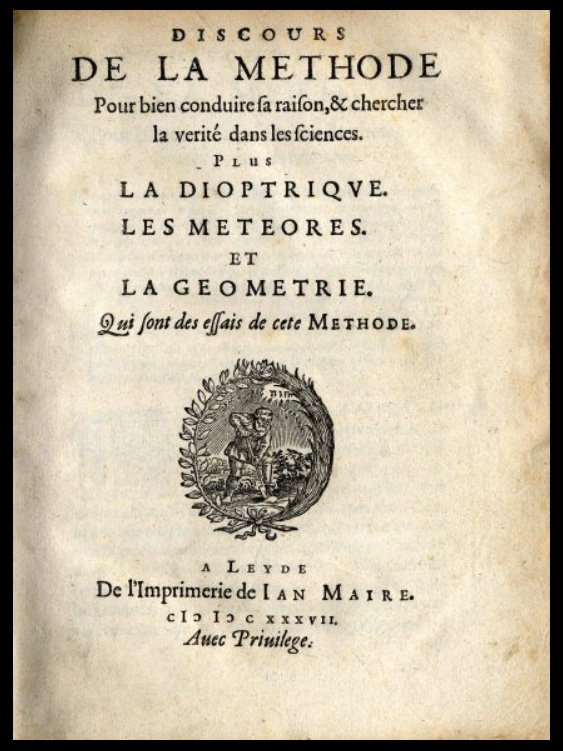
French philosopher René Descartes, who coined the phrase “I think, therefore I am,” laid the foundation for modern philosophy, asserting the certainty of one’s existence through the act of thought. For well over 2,000 years, philosophy has been the cornerstone of human inquiry, aiming to understand reality, morality and the depths of existence. It can be applied to various fields and studies, such as the arts, methods of the sciences, politics, education and religion—seeking to establish standards of evidence, provide rational methods of conflict resolution and techniques for evaluating arguments.
Descartes' birthdate, March 31, serves as a reminder of the crucial but underrated role logic plays in not only the discipline of philosophy, but in shaping the understanding of human existence. Whether through ethical, metaphysical or epistemological exploration, logic works together with philosophy to act as an essential framework in answering the complex questions of life.
To further explore the living tradition of logic and philosophy, Dr. Lianghua Zhou and Dr. Emily Brady from the Texas A&M Department of Philosophy share their academic journeys and reflect on the importance of the discipline.
Philosophy In Motion
The focus on constructing a sound argument aligns with Descartes’ belief that logic and reason are essential for uncovering truth. However, Descartes does raise some criticism about traditional logical methods.
“Descartes points out in his book, Discourse on the Method, that some principles in logic are “harmful or superfluous,” meaning they could mislead or add unnecessary complexity,” Zhou said.

“These concerns about logic lead Descartes to propose a different method, which contains four rules.” Zhou said. “The first was to never accept anything as truth without clear evidence and avoid hasty conclusions. The second was to break problems down into smaller parts, making them easier to address. The third was to approach problems starting from the simplest and moving to the most complex. And lastly, to double-check everything to make sure nothing is missed.”
“Today’s philosophy still involves logic, though today’s logic is much more sophisticated and varied than the kind of logic that Descartes criticizes,” Zhou said. “I recommend reading Roger Ariew’s Descartes and the First Cartesians for more information about Descartes’ view on logic.”
Zhou's academic journey has provided him with a broad foundation in philosophy. He completed his undergraduate degree at Jilin University in Changchun, China, where he was assigned a major in philosophy. He then completed his graduate studies at the University of Michigan in Ann Arbor after finishing master’s degrees at the University of Alberta in Canada and at the University of Virginia.
“When I was a master's student, I focused on contemporary analytic philosophy, which is basically metaphysics,” Zhou said, “But I realized that much of contemporary metaphysical discussion is Aristotelian in nature, which motivated me to study Aristotle and Ancient Greek and Roman philosophy.”
Zhou, who joined the Texas A&M Department of Philosophy in 2024, specializes in Ancient Greek and Roman philosophy, early modern Western philosophy and Asian philosophies, including ancient Chinese thought. He teaches an undergraduate course on classical philosophy which explores the foundational ideas of philosophers such as Socrates, Plato and Aristotle. This semester, he teaches another undergraduate course on comparative philosophy in which he discusses enduring questions about reality, knowledge and morality, drawing from ancient Greek and Chinese sources as well as contemporary perspectives.
“In my classes, I want to give students a broader view of philosophy,” he said. “I’m interested in providing a different perspective of the history of philosophy; the current dominant approach tends to trace its origin to Ancient Greece, but we find that it has roots in Ancient Egypt and many different areas of Asia.”

Regarding the future of philosophy studies, Zhou notes a recent trend toward what some have called a “social turn.” Following the linguistic turn of the late 19th and early 20th centuries, which emphasized the role of language in shaping philosophical problems, contemporary philosophers are now concerned with social dynamics.
“Now scholars are interested in various kinds of social phenomena,” Zhou said. “When they talk about metaphysics, they want to talk about it in context with the social world and explore questions like why social conflicts happen and whether there is a theory that could help us overcome them.”
This shift in focus is reflected at Texas A&M, where Zhou is a part of a pluralistic department that encourages students and faculty to engage with both traditional philosophical questions and more contemporary issues.
“In this department, we have experts in continental philosophy, decision theory, value theory and applied ethics, philosophies of the global South, philosophy of science, and history of philosophy,” he said.
The Beauty Of Thought
Brady, another professor of philosophy, adds a unique perspective through her focus on aesthetics, environmental aesthetics and philosophy of art.
“In college, I was a political science major, but I took a political philosophy course my freshman year and was completely smitten,” Brady said. “When I graduated college, I thought I might go to law school, but I was enjoying philosophy so much that I decided to apply to philosophy graduate school.”
Brady received a master's in philosophy from the University of Edinburgh and went on to complete her Ph.D. in philosophy at the University of Glasgow. Her academic journey shows a deepening focus on aesthetics, particularly how aesthetic experiences involve perception, emotion and imagination and shape our moral relationship with the environment.
“I grew up outside of Washington, D.C., and spent a lot of time in art museums in the city,” Brady said. “And although I do have other philosophical interests, at the heart of those interests lies aesthetics.”
For Brady, the field of aesthetics extends far beyond art and encompasses a wide variety of experiences.
“If you look up aesthetics in the dictionary, it refers to it as the study of beauty or the philosophical study of the arts,” she said. “But I am not particularly fond of that definition. While aesthetics is about the arts, it is also about everyday experiences like fashion, food or various kinds of rituals like cleaning, and the outdoors too — gardens, countryside and nature.”
Brady is working on a project that considers the effects of climate change in relation to aesthetics. She is focusing on the kinds of aesthetic experiences and values that people have in a world that is being changed by global warming.

“For example, glaciers are melting and disappearing,” she said. “This causes major landscape changes locally, with knock-on effects further afield. We might want to ask what kinds of aesthetic losses are happening in terms of cultural meanings and aesthetic attachment to these places.”
“Some people would say that enjoying beauty or responding with wonder for the natural world is icing on the cake, somehow not essential,” she said. “But I disagree. I think our aesthetic experiences of the arts, nature, architecture and fashion give deep meaning to our lives.”
Brady, who joined the Texas A&M Department of Philosophy in 2018, has taught both graduate and undergraduate courses ranging from “Introduction to Philosophy” to “Philosophy of Art.”
“I love introducing students to philosophy,” she said. “It teaches them to have an open mind. In essence, students learn epistemic humility, which enables one to recognize and carefully examine a variety of perspectives.”
Brady resonates with the words of philosopher Bertrand Russell, who stated in The Problems of Philosophy, “The value of philosophy is, in fact, to be sought largely in its very uncertainty.”
“What he means by that, connecting it to epistemic humility, is that I can only be absolutely certain of something once I've examined it carefully,” she said. “Philosophy isn't necessarily embracing this uncertainty, but it's recognizing that good defensible knowledge starts from a point of uncertainty rather than arrogance.”
Philosophy’s relevance lies in its ability to challenge assumptions and engage with the questions that help make sense of the complexities of human existence. Both Zhou and Brady represent philosophy’s diverse areas of thought, from Ancient Greek and Roman philosophy, Asian philosophies and metaphysics to aesthetics, ethics, and the environment. Their work highlights the importance of logic and philosophy, not only within academia but in everyday life.
Resources For Learning More About Philosophy

